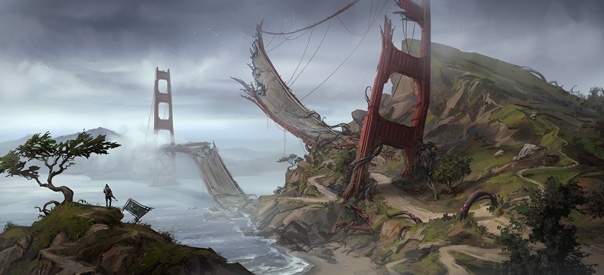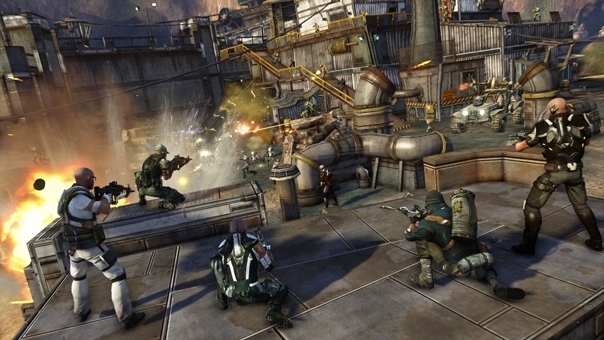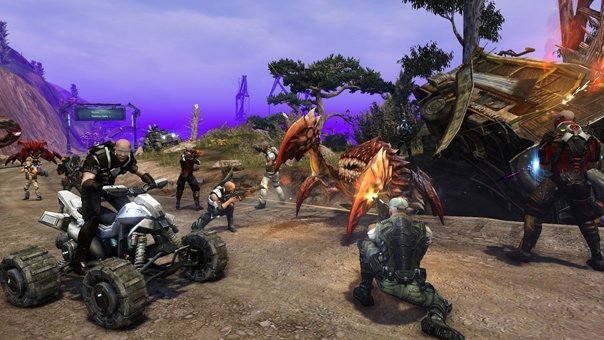Defiance: Future History
Senior producer Rob Hill talks to us about the intricacies of building a universe, developing a console and PC MMO, and keeping the shooter fresh.

Defiance is about more than a game. For Trion Worlds, it’s about building a universe where a deep cross-platform MMO and big-budget TV series can co-exist and interact. Senior producer Rob Hill has been there from the start, helping to shape the idea of the game, and working with SyFy to grow it into something more.
I recently got the chance to try Defiance for myself (more on that later), getting stuck in with the post-apocalyptic third-person shooter, set in a sprawling MMO-ready landscape. Taking a break from mowing down Hellbug skitterings on my quad buggy, I asked Hill about what it’s taken to get this far, some of the nuances of the Defiance universe, and meeting that April 2013 launch date.

ZAM: The film AVATAR had a bible containing all of the universe lore. Do you have something similar for Defiance?
Hill: We do! And as a matter of fact, when we first started talking to SyFy, we started to develop the bible based on those conversations. We came to them, and they were “what kind of literature do you have on the world?” They expected four or five pages, we gave them 200. There’s a lot of background, not just covering St Louis or San Francisco, but actually covering the entire globe, because we want to be able to expand all over the place and provide all sorts of different experiences. So yeah, we’ve got a pretty in-depth history behind the game.
ZAM: Can the game survive without the TV show, or vice versa?
Hill: Absolutely. We developed the two intentionally from the start, to not make it a requirement to watch the show and play the game, to understand what’s going on in either world. We made sure that if you watch the show, or played the game, you’d know what was going on. So we introduce things from the show, but it’s not to the point of if the gamer hasn’t watched the show he has no idea what’s going on. The idea being that if the gamer watches the show, they get much more depth behind it.
We have an example of a character who leaves the show mid-season and comes into the game. The character has a specific type of personality - not a very nice one - in the show, then comes to the game and goes on missions with the player. Based on those missions her personality changes, lightens up, and changes the way she looks. And then she comes back into the show. You don’t have to know all of what happened in the game to realise she’s changed while she’s been away from the show. But the players who experience those missions with her have much more depth. And even when she first leaves the show, the players in the game who watch the television show will go “I don’t know if I trust this person…” because of what she did in the show.
ZAM: Will there be fresh content on a regular basis?
Hill: We are actively trying to keep the game as fresh as possible, but content takes time. We know that we can’t promise “oh, every week we’ll have brand new content”, particularly with the in-depth cutscenes that you saw. We really want to keep that story rolling, and then tell side stories with that kind of depth as well.
So we put in a lot of systems like a competitive multiplayer system, the Arkfall large boss-battle event, and encounters which are things that you can continually redo and get new rewards as reasons for players to keep coming back and trying these things over and over. And then, constantly adding to what we call the power rating cap, so that players can keep expanding on the type of items they find and such.

ZAM: We saw something called EGO, and EGO abilities. How does that work?
Hill: So the ego is an implant, an AI implant. It was developed by Von Bach Industries. He hires you to come to the bay area to find an artifact that he’s been looking for, that he heard was there. As a matter of fact, he comes and you see him during the entire mission, so you’ll be interacting with him, you’ll be going on missions with him at times.
But the EGO itself is an expensive device that not everybody has. Von Bach is a technology dealer, and a weapons dealer, so he has the ability to create these things, and he puts it into the players to help them try and find this device, and survive the harsh area that is the bay area of San Francisco. When you see the HUD for example, that is what the EGO is doing, giving you all that information. The EGO will also update you on missions, and as it’s an artificial intelligence, she will either be very excited about what’s going on, or very depressed about what’s going on, as you go and do things. The EGO also gives you powers, the super speed, the cloak, all that kind of stuff. So the EGO’s this powerful implant that gives you abilities that other people in the Bay Area don’t have.
ZAM: Does this mean that people won’t trust you, because you have all these spangly abilities?
Hill: Not necessarily, because you can help them with it. And as long as they’re paying you, you can help them. That’s your motivation, to do odd jobs for people, beyond even the main storyline, and so they’re grateful you’re there in order to help the situation, even if you’re asking for money.
ZAM: So it’s a bit more mercenary?
Hill: Exactly, that’s what you are. You’re essentially an Indiana Jones mercenary.
Next up: Building for Consoles and that Near-Future Look on Page 2 ->



